

Building mental resilience for the future of work. HR leaders must invest in mental health resources and continue to have open and honest conversations with employees around mental wellbeing.
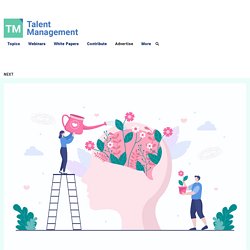
In March 2020, we witnessed a massive transition that would transform the future of work. Workplaces immediately shifted to remote work — in some cases, over the course of a weekend —to protect the health and safety of their workers. Now, as we approach the next phase of this evolution, organizations and employees are faced with another ripe opportunity to redefine work for the better. As a chief people officer, I’ve managed diverse teams globally and believe building mentally resilient workplaces starts with creating an employee-first framework. Open Management: Better work for a better world (1 December 2021) by Rob England and Cherry Vu. Developing new work models. Broaden work and the workforce Instead of atomizing jobs into pieces, an alternative is to broaden them so that the focus is on the broad outcomes to be achieved or problems to be solved.
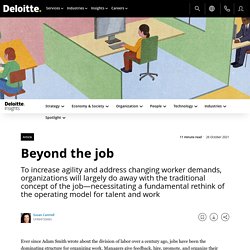
With latitude in defining the “how” of work in pursuit of broad objectives, employees get the opportunity to take on bigger, more integrated roles and responsibilities that often cross functional boundaries and enable them to develop new skills and gain experience. For decades, businesses have gradually embraced worker empowerment, with the move to DevOps, agile, intrapreneurship, teams of teams with distributed control and centralized coordination, self-management, edge-centric decision-making, and “teal organizations” all signaling a direction away from rigid jobs. Many organizations have broadened roles for limited periods of time—for example, through Hackathons, IdeaJams, and Google’s famous “20 percent time” for engineers to spend time on any project they feel will most benefit the company. Ebook: Vaccines, Variants, and Back-to-Office Plans: 3 Crucial Conversations Skills to Alleviate Anxiety.
The Digital Workplace Reimagined Elevating the human experience to unlock productivity. A historic shift in the future of work When COVID-19 became a crisis in early 2020, work for the entire workforce changed.
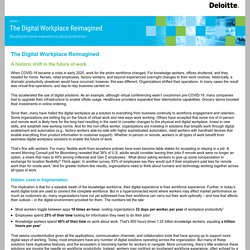
For knowledge workers, offices shuttered, and they headed for home. Nurses, retail employees, factory workers, and beyond experienced overnight changes to their work routines. Historically, a dramatic productivity slowdown would have occurred; however, this was different. Future of Organizations. Unlock growth through democratization. The disruption of the last year has shown that leaders need to make decisions in real time to stay ahead of the competition.
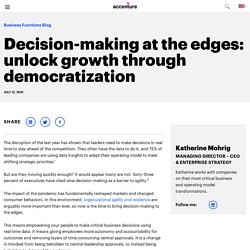
They often have the data to do it, and 75% of leading companies are using data insights to adapt their operating model to meet shifting strategic priorities.i But are they moving quickly enough? It would appear many are not. Sixty-three percent of executives have cited slow decision-making as a barrier to agility.ii. How to Prepare for the Future of Work. About Boston Consulting Group Boston Consulting Group partners with leaders in business and society to tackle their most important challenges and capture their greatest opportunities.
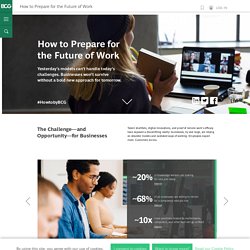
BCG was the pioneer in business strategy when it was founded in 1963. Today, we work closely with clients to embrace a transformational approach aimed at benefiting all stakeholders—empowering organizations to grow, build sustainable competitive advantage, and drive positive societal impact. Our diverse, global teams bring deep industry and functional expertise and a range of perspectives that question the status quo and spark change. BCG delivers solutions through leading-edge management consulting, technology and design, and corporate and digital ventures. . © Boston Consulting Group 2021. How to Redesign Your Office for Hybrid Work. Many employers are in the throes of planning their employees' return to the office.
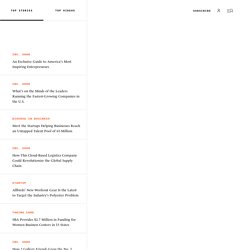
One top-of-mind consideration is how to redesign the office to accommodate new hybrid work models. According to research by Microsoft, 66 percent of employers are redesigning their offices to meet the new demands of hybrid work. As a leader, the decisions you make about redesigning your office space matter. As you contemplate redesigning your office space for a hybrid workforce, here are three strategies to set your employees up for success: 1. Your future work experience is Smart Work Anywhere. Working from the office Bad hybrid experience The train was packed at peak time.
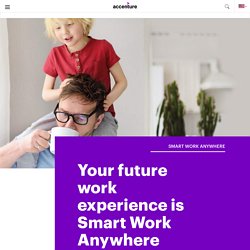
When you arrived at the office, you needed some time to decompress from the stressful journey. You booked a space, but the temperamental technology failed, so colleagues working remotely couldn’t join the meeting. You had to reschedule and push the timeline back. At lunch, you had to eat at your desk as there was no space in the eating area. After lunch you had some focused work to do, but your desk is located underneath the air con, which is cold and noisy. Research Report: The future of work: A hybrid work model. It’s a question many are asking as the collective call to reimagine how and where we work is strong.
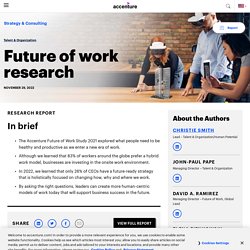
Our Accenture Future of Work Study 2021 of more than 9,000 workers around the world discovered that most people want a hybrid model, where they sometimes work remotely and sometimes go onsite. Why is hybrid so appealing? It brings together the best of both worlds. Those who had a hybrid work model during COVID-19 had better mental health, stronger work relationships and were more likely to feel Net Better Off as a result of working for their organizations. They also experienced less burnout than those who worked entirely onsite or entirely remotely. We also found that 25% of respondents worked fully onsite throughout the pandemic and are likely to remain onsite, whatever their personal preferences may be.
While optimizing remote work is a priority for many companies, we need to reimagine onsite work life as well. It’s not about place, it’s about potential. L’entreprise de demain sera progressiste. Le monde de demain ne peut ressembler à celui d’hier et se conformer aux anciens usages et préceptes sur la mission des entreprises.
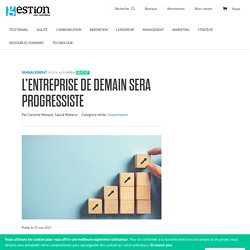
What executives are saying about the future of hybrid work. In the postpandemic future of work, nine out of ten organizations will be combining remote and on-site working, according to a new McKinsey survey of 100 executives across industries and geographies.
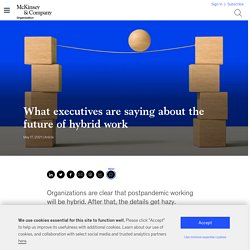
The survey confirms that productivity and customer satisfaction have increased during the pandemic. Despite the embrace of a hybrid model, though, most organizations have only begun to think through and articulate the specifics of how to carry out a more permanent mix of remote and on-site working for all roles that aren’t essential to perform on-site. Many of their employees are feeling anxious as a result. Grabbing hold of the new future of work. The COVID-19 pandemic has dramatically disrupted labor markets across the globe, often with devastating consequences. Now, as infection rates in some countries begin to ebb, many are turning their sights to the future of work beyond the crisis—and to what the pandemic’s more lasting effects on the workforce might look like.
Audio In this episode of McKinsey Talks Talent, McKinsey talent experts Bryan Hancock and Bill Schaninger welcome economist and McKinsey partner Susan Lund to discuss the latest McKinsey Global Institute research on the trajectory of jobs, skills, and other workforce trends in the COVID-19 recovery. An edited version of their conversation with McKinsey Global Publishing’s Lucia Rahilly follows. For more from Bryan and Bill, subscribe to the McKinsey Talks Talent podcast on Apple Podcasts, Google Podcasts, or the audio player of your choice. Identifying roles at risk. Shaping A Better Future - Going Beyond Business As Usual.
About Boston Consulting Group Boston Consulting Group partners with leaders in business and society to tackle their most important challenges and capture their greatest opportunities. BCG was the pioneer in business strategy when it was founded in 1963. Today, we help clients with total transformation—inspiring complex change, enabling organizations to grow, building competitive advantage, and driving bottom-line impact. To succeed, organizations must blend digital and human capabilities. MIT Sloan Management Review. Topics Frontiers An MIT SMR initiative exploring how technology is reshaping the practice of management. The future of work is written. Contrary to popular belief, distributed work isn’t a modern invention. The Roman Catholic Church, for example, has been working at a distance for centuries; so have organizations like the Hudson’s Bay Company.1 Distributed work is the evolution of telecommuting, which originated with in-home sales like the Tupperware parties of the 1950s.
Telecommuting itself was later adopted by government institutions like NASA, motivated by the 1970s energy crisis, and eventually found its way to technology companies like IBM. Contemporary distributed work is enabled by the internet and software tools and fueled by the increased demand for experienced talent regardless of their proximity to an office. The competition for software engineers has encouraged companies to expand their hiring pools beyond their immediate geography, increasing the bargaining power of workers with desirable skills. Recommended Reading on the future of work. The Uncertainty Mindset & the Future of Work. Hi everyone, As this year continues to generate fresh disasters and difficulties across the globe, and forces many of us to adapt to a fast-changing environment, the idea that we need to develop an “uncertainty mindset” is compelling. What does it mean for an individual and an organisation to develop such a mindset?
What does it imply for our ways of working? That’s the theme of a recently published book by Vaughn Tan, a professor of strategy (and ex-Googler), titled The Uncertainty Mindset. For close to a decade, Tan watched closely how a group of highly innovative R&D food labs across the world of high-end cuisine approached innovation. This Company's New 2-Sentence Remote Work Policy Is the Best I've Ever Heard. As Covid-19 rages on, more and more companies are making the move to remote work. The newest member of the club: Siemens. Headquartered in Germany, Siemens is one of the largest companies in the world--a member of the Global Fortune 500 with over 380,000 employees. You probably know Siemens for its electronics or appliances, although the company is also a leader in multiple industries including transportation, renewable energy, and medical equipment.
At first glance, Siemens' recent announcement doesn't seem all that exciting. Yes, the company is adopting a new model that will allow employees worldwide to work from anywhere they feel comfortable "for an average of two to three days a week. " 82 per cent of Companies to let Employees Work Remotely for the time being: Gartner. COVER STORY: COVID-19 Employee Exchanges may Foretell the Future of Work. Reimagining the post-pandemic organization. It’s said that the worst of times brings out the best in people; as it happens, this is true of organizations as well.
All over the world, companies are being challenged by the COVID-19 crisis to find new ways to serve their customers and communities. Many are rising to the occasion. Almost every leader we speak with has an inspiring story of radical, positive change in how work gets done and what it can accomplish. Here are a few examples: A fast-food chain that had to shutter its operations avoided layoffs by partnering with a health and wellness retailer, thus helping the retailer meet spiking demand in a newly designated “essential business.”
From thinking about the next normal to making it work: What to stop, start, and accelerate. What’s next? That is the question everyone is asking. Accelerating through the turn Our point of view on preparing for a future beyond the crisis. How business leaders can plan for the next normal. Use technology to reopen your business sooner and safer. Preparing Your Business for a Post-Pandemic World. Executive Summary Coronavirus has impacted the world at an unprecedented level — and unfortunately, the worst has yet to come. Companies need to act today in order to bounce back successfully in a post-corona marketplace. The abrupt shift to remote agile teams. As organizations adapt to the ongoing COVID-19 crisis, their agile teams can be a real source of competitive advantage. The Adaptation Advantage: Let Go, Learn Fast, and Thrive in the Future of Work (2020) by Heather E.McGowan and Chris Shipley.
Top 25 Tips and Tricks for Remote Collaboration. The rise of COVID-19 (coronavirus) has made remote collaboration an overnight necessity for many companies. We’ve already seen many of our own clients canceling workshops and limiting travel, and organizations around the world are following suit. MIT Sloan Management Review. Is Working Remotely Effective? Gallup Research Says Yes. Story Highlights. Getting practical about the future of work. Future of Work: Top 9 uncertainties. The World in 2030: Nine Megatrends to Watch. Top Work Trends For 2020 And Beyond. Future of Work: Top 9 uncertainties. World Economic Forum. McKinsey&Company. How ready is your organisation for the future of work? - A survey. The Real Future of Work: The Agility Issue. America’s future of work. Future of work in America. Jobs of The Future: A report created by Deakin University, Griffith University and Ford. Futurework: Managing Complexity With Simplicity.
The Future of Work. Future Workforce. The Real Future of Work: Agility Issue. The Real Future of Work: Agility Issue. The Real Future of Work: Agility Issue. Future of HR 2018. Transitioning to the future of work and the workplace. Leading Into the Future. Building an Engaged, Inclusive & Collaborative Workplace. Transitioning to the future of work and the workplace. How can business leaders, policy makers, and individuals prepare today for the jobs of tomorrow? How Human-Computer ‘Superminds’ Are Redefining the Future of Work. AI, automation, and the future of work: Ten things to solve for (Tech4Good)
Capitalizing on the Most Important Part of a Learning Session: The Experience - Timothy C. Clapper, 2018. Future Workforce: Reworking the Revolution - Accenture. Future of Work overview - Deloitte. What Will Work Look Like in 2030? Could the Future of Work in Fact be Human? - Korn Ferry Focus. Screw Emotional Intelligence–Here’s The Key To The Future Of Work. Are you ready for the third generation of work? – World Economic Forum. What the future of work will mean for jobs, skills, and wages: Jobs lost, jobs gained.